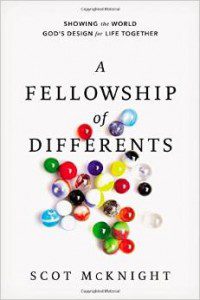 Some of you will have heard that a firestorm erupted recently at Moody Bible Institute over the claim of “white privilege.” (#MBIprivilege) What astounds me — and I say this as one who is part of a system called the USA that has systemically excluded African Americans and Latin Americans and Asian Americans from their place at the table — is how incredibly distant such discussions can become from the Bible.
Some of you will have heard that a firestorm erupted recently at Moody Bible Institute over the claim of “white privilege.” (#MBIprivilege) What astounds me — and I say this as one who is part of a system called the USA that has systemically excluded African Americans and Latin Americans and Asian Americans from their place at the table — is how incredibly distant such discussions can become from the Bible.
The president at MBI made a responsible statement; a professor had earlier made an irresponsible statement and he apologized; but the student body is stuck in the muck of ambivalence about who sits where at the table.
I want to put on the table two beautiful texts in the New Testament, make an observation and then make the simple claim that the church is the one place where privilege should not only be acknowledged but repented from. Here we go, Galatians 3:28 and Colossians 3:11:
Gal. 3:28 There is neither Jew nor Gentile, neither slave nor free, nor is there male and female, for you are all one in Christ Jesus.
Col. 3:11 Here there is no Gentile or Jew, circumcised or uncircumcised, barbarian, Scythian, slave or free, but Christ is all, and is in all.
These are incredibly ambitious statements and hopes by the apostle Paul. They emerge from a world where such visions were more than difficult to put into practice, but Paul wanted his churches to unleash the power of the Spirit so these visions could become realities in the Roman empire.
My observation is this: the originating vision of the apostles, especially of the apostle Paul who called his vision God’s “mystery,” was to create a new kind of family, one not known in the Mediterranean — a family that would welcome all to the table as “one” in Christ. One in which our identity in Christ gave us the leverage by the power of the Spirit to embrace (that’s the name of MBI’s African American group as I understand the facts) those whom we have previously “othered” into lesser status. One in which diversity would be not only acknowledged as real and good but transcended by love so that one new family would be created. Jews didn’t become Gentiles and women didn’t become men but those identities were transcended in a new kind of fellowship of embrace.
In my brand new book I call this vision of the church a “fellowship of differents” because the church — denying its gospel and denying its originating vision and denying the mission of God in this world — has created a fellowship of the “sames.” The book, now out, is called A Fellowship of Differents and it sketches what the Christian life looks like if we take Paul’s vision as ours — what happens when “We” becomes bigger than “Me”? What happens when the Christian life is about life in this new fellowship of differents and what virtues do we need to live in such a fellowship? What happens to spiritual gifts when it is about life together?
What this means for you and me is the intentional discipline of embrace: males and females not just males and not just females; African Americans, Asian Americans, Latin Americans and whites with privilege — together; economically upper class, middle class and the poor all in one fellowship; ageism too — widows and widowers and seniors and the children all together, all embraced, all welcomed.
What sadly happened at MBI, and I trust is being rectified, then…
Denied the very mission of the church. The one place where embrace of those otherwise “othered” ought to occur is the church. The one place where confession of privilege and power — even if invisible to those in power and privilege — should happen is in the church. The apostle Paul set the pattern here when he taught his fellow Jewish believers to deny their privilege to open their arms to Gentiles in a new fellowship of differents.
The church is called by God to dismantle systemic divisions between peoples and races and ethnicities and genders and statuses. It is the place where cultural slurs — like “Scythians” which was one 1st Century equivalent to a slur like “hillbilly” — are to be known as a thing of the past because Scythians have become brothers and sisters.
You may know the brilliant novel by Ralph Ellison called Invisible Man, the story of a black man in American society and the man has no name in the whole book. Why? He was invisible in society.
So let me say this to Moody Bible Institute and all concerned: the mission of the church is make invisible people visible.
For that to happen, we must admit the power of privilege that makes our own status “invisible” to us.
Can I get an Amen?!











